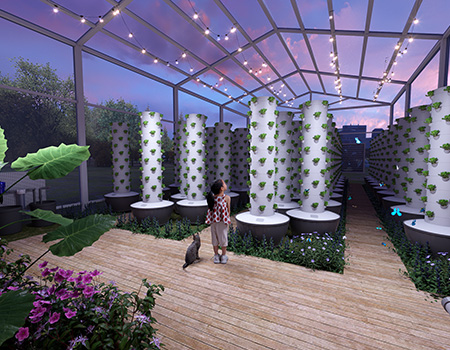In countries such as the United Arab Emirates and Israel, container agriculture has become the choice of some people due to the relatively scarce water resources and arable land. In addition, some people are very optimistic about the hydroponics industry, and they are also willing to develop container agriculture.
Is container agriculture worth developing?
The answer is yes, container agriculture is the future of sustainable farming.Container planting is a modern agricultural planting method. It has many advantages. On the one hand, it effectively alleviates the contradiction between the needs of contemporary agricultural development and the scarcity of water and soil resources; The second is that container agriculture is environmentally friendly agriculture, completely adopting hydroponic cultivation methods. Planting crops does not require the use of pesticides, not only protecting people's health, but also preventing water and soil pollution.

How does a container planting system achieve crop planting?
Containers were originally used to transport goods, but agricultural scientists and technicians broke the boundaries of food production. Let's not plant crops in the field, but in convenient and fast containers. There are various devices inside the container, such as automatic control systems, timing systems, and so on. The role of these devices is to provide the necessary growth environment for plant growth. In addition, there are many settings in the container that are convenient for liberating the hands of growers: automatic climate control, circulating irrigation systems with water filtration, carbon dioxide generators, and control systems.
What are the advantages of container planting?
Container vegetables are green, healthy, pollution-free, and have high nutritional value.
According to research, most vegetables lose up to 55% of their nutrients within a week after harvest. Using container planting can greatly shorten the supply chain, reduce transportation processes, and ensure maximum freshness and nutrition. In addition, the nutritional value of hydroponic vegetables is higher than that of traditional soil grown vegetables because hydroponic nutrient solutions can be effectively absorbed by crops and improve the utilization rate of nutrient solutions.

Higher vegetable production in containers
Container planting is a vertical space stacked for planting, which can maximize the use of space. The container can be planted with nearly 8000 plants, or even more. The number of vegetables that can be planted varies for each type of container. For example, a zip system container can grow 5000 to 9000 plants.
The container system is not affected by the weather and season, and can be planted throughout the year.
Growing vegetables in containers does not have to worry about the impact of extreme weather and seasonal changes.Vegetables can grow normally in containers with controllable temperature and humidity. Controlling in containers based on different crop types can ensure the growth and harvest of vegetables throughout the year.
Currently, there are many types of plants that can be grown in container systems. In addition to the vegetables, fruits, grasses, and herbs we usually eat, we can choose the most suitable container system for planting different plants. In summary, container farming will definitely be the most important component of future agriculture in the future.








.jpg)
